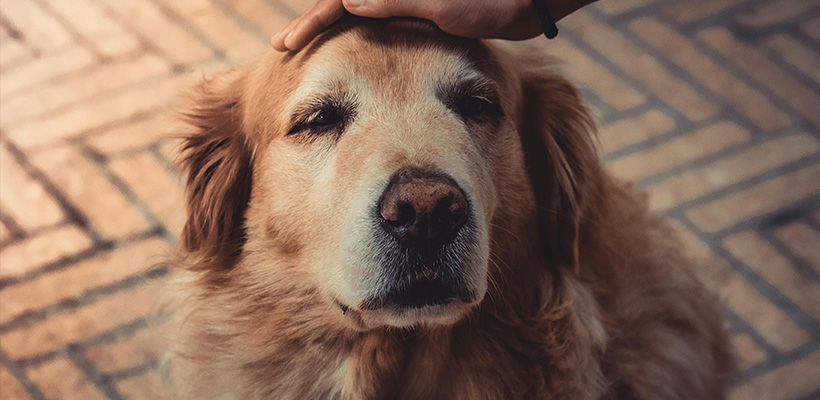
Canine Dementia: Signs, Symptoms and How to Help as Your Dog Ages
As our furry friends get older, their health may change. It’s a part of life, and it’s important to understand these changes so you can help your pup be as happy and comfortable as possible. One issue that senior dogs sometimes face is canine dementia, also known as canine cognitive dysfunction. This condition can be difficult for both the dog and their owner, but understanding the condition and how to improve their quality of life can make it much more manageable. With that in mind, let’s dive into canine dementia, symptoms to watch out for, preventative measures and treatment options.
Can Dogs Get Dementia?
Yes, unfortunately, dogs are susceptible to dementia. In medical terms, it’s often referred to as Canine Cognitive Dysfunction (CCD). Just like Alzheimer’s and dementia in humans, CCD can affect a dog’s memory, learning and behavior. As a dog’s brain ages, the risk of canine dementia can increase. In fact, half of dogs over the age of 11 often display clinical signs of canine dementia. While everyone hopes this is a condition their dog doesn’t have to deal with, it’s important to be aware of the possibility and how common this condition can sometimes be.
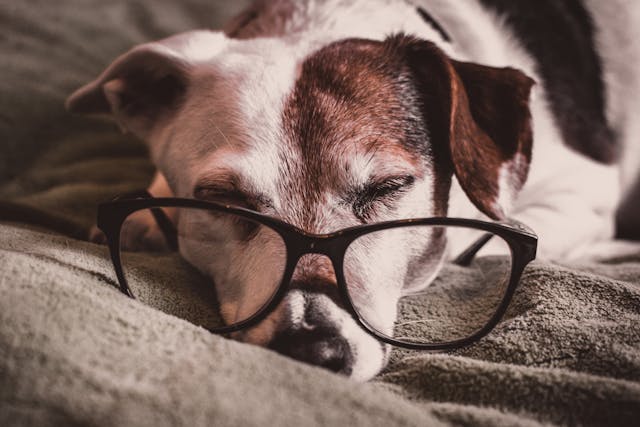
Recognizing the Signs and Symptoms
Dog dementia can manifest in various ways, with symptoms ranging from mild to severe. Typically, symptoms will worsen over time. With that in mind, here are some signs and symptoms to watch out for as your dog ages:
- Disorientation
- Confusion
- High Anxiety
- Forgetting routines and commands
- Irritability
- Losing the desire to play
- Aimlessness
- Staring blankly into space
- Difficulty learning
- Loss of appetite
- Changes in sleep
While this list isn’t exhaustive, these are common signs and symptoms that are good to be aware of. Remember, this condition may manifest differently in every dog. If you observe one or more of these changes in your senior dog, it’s a good idea to speak with your vet.
The Causes of Canine Cognitive Dysfunction
At this time, we don’t know the exact cause of Canine Cognitive Dysfunction. Of course, the condition is most closely correlated with the changes a dog’s brain goes through as it ages. Other contributors to CCD may include genetic predispositions, brain tumors, brain trauma and environmental factors.
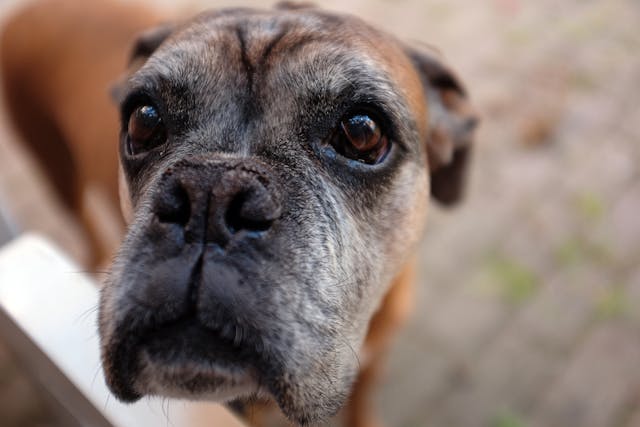
How to Help Your Senior Pup
Supporting a senior dog with dementia can sometimes be difficult, but it’s something that many senior pet owners go through. Fortunately, there are strategies and resources available that can make life more comfortable for your pup while also making things easier for you. Let’s explore some ways you can help your senior dog during this phase of life.
Safety and Comfort: Creating a Dementia-Friendly Home
You can drastically improve your senior pup’s quality of life by making a few changes around your home. Some changes you might try include:
- Keep clutter to a minimum — Try to minimize clutter in your home. Dogs with dementia may find it difficult to navigate a cluttered home and could become disoriented.
- Make sure your home is well-lit — Senior dogs may sometimes have trouble seeing like they used to, so making sure their environment has good lighting can make it easier for them to navigate the home.
- Don’t change things up — Try to avoid making major changes to your home’s layout, as this can be disorienting to a dog with dementia.
- Use gates — You may need to invest in some dog-proof gates to prevent your dog from wandering where they shouldn’t go. For instance, it might be a good idea to block off stairs.
- Create a comfortable resting space — Make sure your pup has a comfortable and quiet place to relax. This can help reduce the anxiety and disorientation that sometimes comes with doggy dementia.
- Prepare for accidents — Your pup may end up having more accidents than usual. Make sure to be patient with them and consider investing in puppy pads or diapers to make cleanup easier.
Exercise and Mental Stimulation Are Important
Senior dogs with dementia can benefit a lot from exercise and mental stimulation. Not only is this enjoyable for them, but it may also help to slow the progression of cognitive decline. Other benefits include helping them maintain a healthy weight and helping encourage better sleep.
However, make sure your exercise plans are something they can manage in their old age. Instead of taking long walks, consider shorter, more frequent walks to let your pup rest while still getting their exercise. If they enjoy playing, make sure to play their favorite games with them. Of course, if you notice pain, you may need to slow things down. Talk to your vet about what exercise plan is best for your dog’s health. They may have more specific suggestions based on your dog’s individual needs.
Mental stimulation is also critical. Activities that challenge your dog’s mind can help them stay sharp. Try giving them toys that reward treats when manipulated correctly. You could also consider trying to teach them new tricks, as this can help provide a beneficial mental challenge as well.
It’s important to remember that your dog’s ability to engage in mental and physical activities may diminish over time. But by being proactive and paying attention to what they can handle, you can make sure your pup is as engaged as possible while also keeping them comfortable.
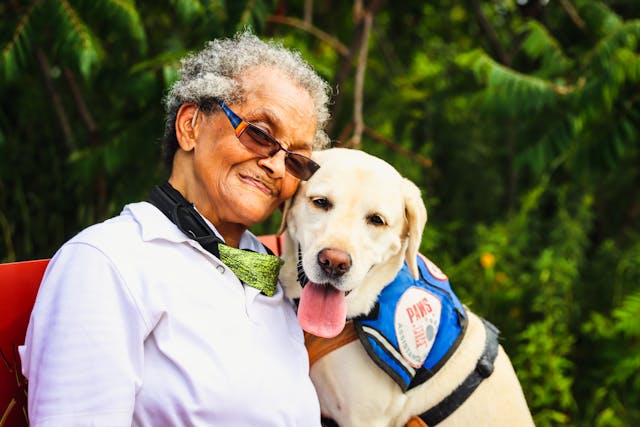
Diet and Nutrition in Managing Dog Dementia
Proper diet and nutrition can also help manage dog dementia. Typically, a diet rich in antioxidants, vitamins and Omega-3 fatty acids will be recommended to help slow cognitive decline. These vitamins and nutrients work to help reduce oxidative damage and inflammation in the brain.
Fortunately, there are certain foods and supplements available to make it easier to administer these nutrients to your senior pup. With that being said, diet and nutrition can be tricky, especially with senior dogs. You should always consult your veterinarian to ensure you’re making the right adjustments to your dog’s diet. They can recommend the best foods, supplements and medications to help your dog based on their specific needs and condition.
Establishing a Consistent Routine
It can help your dog feel more comfortable and reduce anxiety by keeping them on a consistent daily routine. Here’s an example of a structured day for your pup:
- Start your day with a morning walk, followed by breakfast at the same time each day. Regular feeding times not only aid digestion but also help to give structure to their day.
- Create specific times for play, mental stimulation activities and relaxation.
- Go for a short evening walk before their evening meal.
- Try to keep bedtime consistent. This can help regulate their internal clock and is especially helpful if they’re experiencing abnormal sleep schedules due to their condition.
Remember, your dog may not always remember their routine, and it can take some patience to keep them on track. Gently guiding them through their day and offering reassurance can help keep them calm and comfortable. Also, remember that change can be disorienting, so if you need to introduce new changes due to your own schedule, try to do so gradually.
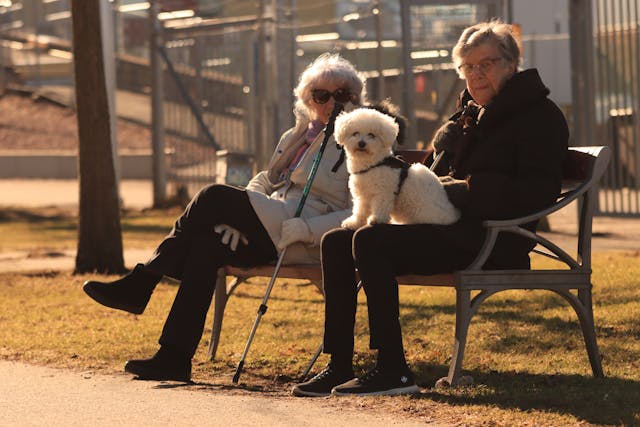
Advanced Care for Older Dogs with Dementia
Unfortunately, there is no cure for dog dementia. However, there are treatment options to help manage their condition and improve their quality of life. These treatments may include medication, changes to diet, supplements, lifestyle changes and lifestyle enrichment. Your vet can help determine the best path of treatment for your pup and guide you through this sometimes difficult time.
When to Seek Veterinary Assistance
If you have a senior dog and you’re seeing the signs of dementia, it’s always a good idea to keep your vet in the loop. Changes in behavior could warrant a check-up or a conversation with your vet on what to watch for. If your dog suddenly starts experiencing severe symptoms, then you should immediately seek emergency veterinary attention.
Remember, early diagnosis can be a big help when it comes to managing your pup’s condition and slowing the progression. Regular check-ups can be very helpful when you have a senior dog, and your vet can help treat potential issues as soon as possible.
Celebrating Life: Make the Most of Every Moment
Finally, remember that your dog is still your beloved companion! Although they may be experiencing some changes, they still are the pup you brought into your home. It’s important to cherish the time you have with your dog, celebrate life and make the most of every moment you have with them. This only improves the bond between you and your dog and makes them happier as they gracefully take on their golden years. Although canine dementia can be difficult, taking the right treatment steps and enjoying your time with your pup can make things as easy and enjoyable as possible for both you and your dog.
